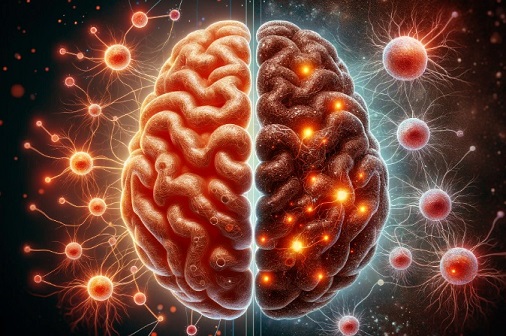Nikhil Prasad Fact checked by:Thailand Medical News Team Jan 14, 2025 11 months, 3 weeks, 1 day, 4 hours, 21 minutes ago
Medical News: A Growing Concern
Neurodegenerative diseases (NDDs) are among the most prevalent disorders affecting the central nervous system (CNS), especially in adults. These diseases, such as Alzheimer’s disease (AD), Parkinson’s disease (PD), Huntington’s disease (HD), and amyotrophic lateral sclerosis (ALS), cause progressive loss of neurons, leading to severe health impacts. Recent research has uncovered a potential link between viral infections and the onset or progression of these disorders, adding another layer of complexity to their already multifactorial nature. This
Medical News report explores how certain viruses may influence NDD development, highlighting insights from a comprehensive review by researchers from Zewail City of Science and Technology in Egypt.
 Viruses and Neurodegenerative Diseases
How Viruses Interact with the Brain
Viruses and Neurodegenerative Diseases
How Viruses Interact with the Brain
The blood-brain barrier (BBB) serves as a protective shield for the brain, limiting the entry of harmful substances, including pathogens. However, some viruses, known as neurotropic viruses, have mechanisms to bypass this barrier and infiltrate the CNS. Once inside, they can trigger inflammation and immune responses that, if prolonged, lead to significant neuronal damage. The immune response often involves the activation of Toll-like receptors (TLRs) on various brain cells, resulting in the production of pro-inflammatory cytokines. This persistent inflammation creates a vicious cycle of neurodegeneration.
Notably, viruses can infect neurons directly or cause damage indirectly by overactivating the immune system. Epstein-Barr virus (EBV), influenza, and herpes simplex virus (HSV) are examples of viruses linked to an increased risk of NDDs. This relationship is supported by large-scale studies like those conducted in Finland and the UK, which revealed that viral infections, such as encephalitis, could significantly increase the likelihood of developing conditions like Alzheimer’s disease.
Specific Viruses and Their Links to NDDs
-Alzheimer’s Disease (AD): AD, the most common form of dementia, is marked by brain atrophy and the accumulation of amyloid-β plaques and tau protein tangles. Studies suggest that cytomegalovirus (CMV) and HSV infections can exacerbate these pathological features. For instance, HSV-1 has been associated with a higher prevalence of AD in individuals carrying the APOE∆ε4 allele. Additionally, COVID-19-related inflammation and hypoxia may accelerate AD progression by increasing biomarkers such as phosphorylated tau.
-Parkinson’s Disease (PD): PD is characterized by the loss of dopaminergic neurons and the aggregation of alpha-synuclein proteins. Hepatitis C virus (HCV) and EBV have been linked to PD through mechanisms like antigen mimicry and neuronal toxicity. Interestingly, while some herpesviruses may reduce PD risk, others, such as herpes zoster virus, have shown the opposite effect, potentially due to neuroinflammatory pathways.
-Amyotrophic Lateral Scle
rosis (ALS): ALS leads to motor neuron degeneration, resulting in paralysis. Viruses such as coxsackievirus B3 (CVB3) and HSV are implicated in ALS development. They may worsen neuroinflammation or trigger the disease in genetically predisposed individuals. SARS-CoV-2 has also been observed to cause significant declines in ALS patients, further emphasizing the role of viral infections in this disease.
-Multiple Sclerosis (MS): MS is an autoimmune disorder where the immune system attacks the myelin sheath surrounding neurons. EBV and human herpesvirus-6 (HHV-6) are strongly linked to MS through mechanisms like the production of autoantibodies and inflammatory cascades. Studies have also shown that varicella-zoster virus (VZV) reactivation may trigger MS relapses.
The Role of Vaccines in NDDs
The COVID-19 pandemic has raised questions about whether vaccines play a role in preventing or exacerbating NDDs. Evidence suggests that vaccines against neurotropic viruses may reduce the risk of associated NDDs. However, there are isolated reports of new-onset ALS and other complications following COVID-19 vaccination, especially in individuals with genetic predispositions. This underscores the importance of personalized approaches to vaccination in vulnerable populations.
Therapeutic Strategies and Challenges
-Immunotherapy: Advances in immunotherapy aim to target specific aberrant proteins involved in NDDs. For example, Aducanumab, an anti-amyloid monoclonal antibody, has been approved for Alzheimer’s treatment. Similar therapies are under development for tau proteins and alpha-synuclein in PD.
-Stem Cell Therapy: Stem cell-based approaches show promise in replacing or supporting damaged neurons. Induced pluripotent stem cells (iPSCs) offer potential for personalized treatments, while mesenchymal stem cells (MSCs) demonstrate immunomodulatory properties.
-Extracellular Vesicles (EVs): EVs, including exosomes, are being explored as vehicles for delivering therapeutic agents across the BBB. They hold potential for treating NDDs and combating viral infections simultaneously.
-Gene Therapy: Gene-editing techniques like CRISPR are being investigated to correct genetic mutations associated with NDDs. Therapies targeting neuroinflammation, such as IL-2 gene delivery, have shown protective effects in preclinical models.
Conclusions: A Path Forward
The intricate relationship between viruses and neurodegenerative diseases highlights the need for further research to unravel the underlying mechanisms. While the evidence suggests that viral infections can exacerbate or trigger NDDs, the exact pathways remain elusive. This complexity underscores the importance of developing multidisciplinary strategies to prevent and treat these conditions.
Future studies should focus on identifying reliable biomarkers, enhancing therapeutic delivery methods, and addressing the long-term effects of viral infections on the CNS.
The study findings were published in the peer-reviewed journal: Journal of Translational Medicine.
https://link.springer.com/article/10.1186/s12967-024-06025-6
For the latest on neurodegenerative diseases, keep on logging to Thailand
Medical News.
Read Also:
https://www.thailandmedical.news/news/thailand-medical-study-involving-ginger-phytochemicals-could-transform-neurodegenerative-disease-treatments
https://www.thailandmedical.news/news/phytochemicals-from-euphorbia-peplus-enhances-autophagic-flux-and-aids-in-the-treatment-of-neurodegenerative-diseases
https://www.thailandmedical.news/news/ketone-supplements-could-revolutionize-brain-injury-treatment-and-aid-in-neuroregeneration
